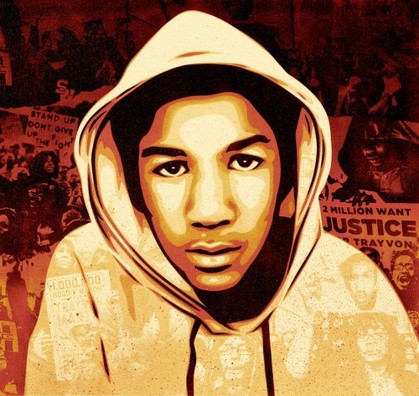POLL RESULTS: EFFECTS OF THE TRAYVON MARTIN-GEORGE ZIMMERMAN CASE ON AMERICAN THOUGHT |
September 7, 2013
Written by Serie McDougal and Sureshi Jayawardene
Written by Serie McDougal and Sureshi Jayawardene
Blacks say racism was significant; Whites say too much media involvement.
|
Oakland, CA.
On August 4th, Afrometrics conducted an online poll on how the killing of Trayvon Martin and the George Zimmerman trial affected people’s attitudes. Several questions were asked about: what solutions people saw to the problem of racial injustice in the United States, how surprised or not surprised people were at the outcome of verdict in the Zimmerman trial, how stressed people were at the killing of Trayvon Martin, whether or not people felt Trayvon’s killing sent a message to African Americans and what that message was, and the extent to which African American lives are valued in the United States. The following is an executive summary, followed by a more extensive explanation of each analysis. EXECUTIVE SUMMARY Level of education had a strong impact on attitudes about the killing of Trayvon Martin. As it turned out, the higher people's levels of education were, the more likely they were to see Trayvon's killing as a racist act. Less educated poll participants were less likely to see racism in Trayvon Martin's death (in this case, education is being defined as highest degree acquired). Those with higher levels of education were more likely to report experiencing personal stress or anxiety as a consequence of Trayvon Martin’s killing and the outcome of the Zimmerman trial. The more educated people were the more likely they were to be personally affected by the incident. Race had a major impact on people’s attitudes about the killing of Trayvon Martin. African Americans and Latino\Latinas were the least likely to believe that the US criminal justice system values the lives of African Americans. African Americans’ and Latino\Latinas’ attitudes differed significantly from the attitudes of White Americans, Native Americans, and Asian Americans on the extent to which the US values Black life. African Americans and Latino\Latinas were more likely to believe that White people’s lives are valued in America more so that African American people’s lives. African Americans were significantly more likely to believe that the killing of Trayvon Martin was a racist act compared to White Americans, Native Americans, Asian American, and those who identified with another racial category. African Americans were significantly more likely than White Americans to believe that the killing of Trayvon Martin and the outcome of the Zimmerman trial sent a message to African Americans. |
Most African Americans and Latino\Latinas reported experiencing stress as a consequence of the Killing of Trayvon Martin. Significantly fewer White Americans reported experiencing stress or being personally affected as a consequence of Martin’s death.
The more people believed that the US criminal justice system values the lives of Black people, the less likely they were to experience any anxiety as a result of Trayvon Martin’s killing, and the less likely they were to see the killing of Trayvon Martin as a racist act. There was a direct relationship between perception of racism and stress. The more people believed that race was relevant in the killing of Trayvon Martin, the more likely they were to experience stress as a result of his death. African Americans were more likely to point out that acknowledging racial injustice as a problem was necessary in order to begin considering solutions. Other solutions to address racial injustice were: redistribution and reorganization of power, education, systemic change, and a change in laws as expressed by African American poll participants. White American respondents pointed to media constraint, personal responsibility of African Americans, racism towards White people and, the prevention of “race-baiting” among Black leaders as solutions. |
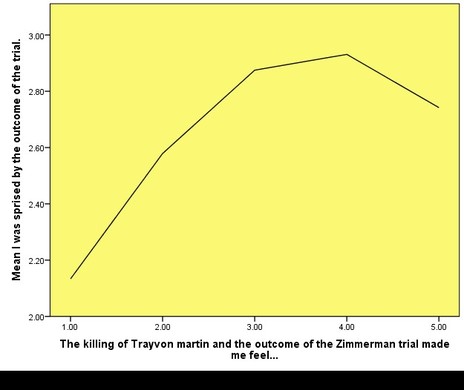 Table 1: Stress and Surprise
Table 1: Stress and Surprise
Stress and Surprise
A Pearson correlation was conducted to determine the relationship between how surprised people are about the outcome of the Zimmerman trial and the level of stress they experienced as a result of the trial. A multiple correlation revealed that there is a significant (p<.05) positive relationship between how surprised people are about the outcome of the Zimmerman trial and the level of stress they experienced as a result of the trial (.218), such that the more people were surprised about the outcome of the trial, the more likely they were to experience stress. However, there was an interesting drop off for people who reported being “extremely stressed” as a consequence of Trayvon Martin’s killing; they were less surprised than people reported being “stressed” (see Table 1).
A Pearson correlation was conducted to determine the relationship between how surprised people are about the outcome of the Zimmerman trial and the level of stress they experienced as a result of the trial. A multiple correlation revealed that there is a significant (p<.05) positive relationship between how surprised people are about the outcome of the Zimmerman trial and the level of stress they experienced as a result of the trial (.218), such that the more people were surprised about the outcome of the trial, the more likely they were to experience stress. However, there was an interesting drop off for people who reported being “extremely stressed” as a consequence of Trayvon Martin’s killing; they were less surprised than people reported being “stressed” (see Table 1).
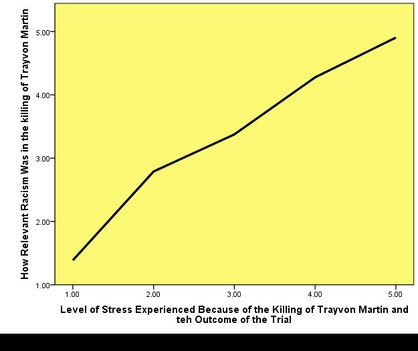 Table 2: Stress and Relevance of Racism
Table 2: Stress and Relevance of Racism
Stress and Relevance of Racism
A Pearson correlation was conducted to determine the relationship between how surprised people are about the outcome of the Zimmerman trial and how relevant they felt racism was in the killing of Trayvon Martin. A correlation revealed that there is a significant (p<.05) positive relationship between how surprised people are about the outcome of the Zimmerman trial and how relevant they felt racism was in the killing of Trayvon Martin (.259), such that the more people were surprised about the outcome of the trial, the more likely they were to feel that racism was relevant in the killing of Trayvon Martin (see Table 2).
A Pearson correlation was conducted to determine the relationship between how surprised people are about the outcome of the Zimmerman trial and how relevant they felt racism was in the killing of Trayvon Martin. A correlation revealed that there is a significant (p<.05) positive relationship between how surprised people are about the outcome of the Zimmerman trial and how relevant they felt racism was in the killing of Trayvon Martin (.259), such that the more people were surprised about the outcome of the trial, the more likely they were to feel that racism was relevant in the killing of Trayvon Martin (see Table 2).
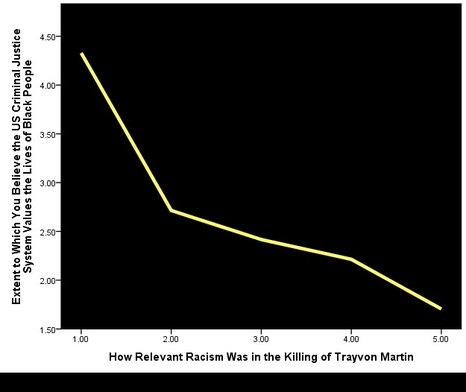 Table 3: Value of Life and Relevance of Racism
Table 3: Value of Life and Relevance of Racism
Value of Life and Relevance of Racism
A Pearson correlation was conducted to determine the relationship between how much people feel the US criminal justice system values the lives of Black people and how relevant they felt racism was in the killing of Trayvon Martin. A correlation revealed that there is a significant (p<.05) negative relationship between how much people feel the US criminal justice system values the lives of Black people and how relevant they felt racism was in the killing of Trayvon Martin (-.773), such that the more people felt that the US criminal justice system values the lives of Black people, the less likely they were that racism was relevant in the killing of Trayvon Martin (Table 3).
A Pearson correlation was conducted to determine the relationship between how much people feel the US criminal justice system values the lives of Black people and how relevant they felt racism was in the killing of Trayvon Martin. A correlation revealed that there is a significant (p<.05) negative relationship between how much people feel the US criminal justice system values the lives of Black people and how relevant they felt racism was in the killing of Trayvon Martin (-.773), such that the more people felt that the US criminal justice system values the lives of Black people, the less likely they were that racism was relevant in the killing of Trayvon Martin (Table 3).
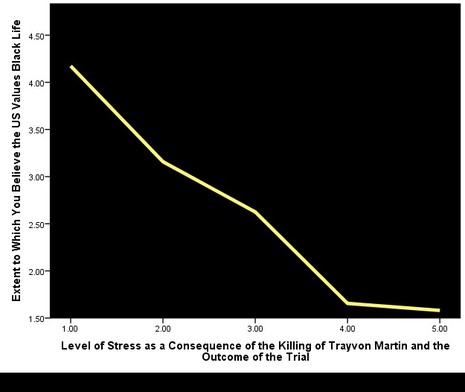 Table 4: Value of Life and Relevance of Raqcism
Table 4: Value of Life and Relevance of Raqcism
Value of Life and Relevance of Racism
A Pearson correlation was conducted to determine the relationship between how much people feel the US criminal justice system values the lives of Black people and how relevant they felt racism was in the killing of Trayvon Martin. A correlation revealed that there is a significant (p<.05) negative relationship between how much people feel the US criminal justice system values the lives of Black people and how relevant they felt racism was in the killing of Trayvon Martin (-.773), such that the more people felt that the US criminal justice system values the lives of Black people, the less likely they were to experience stress as a result of the trial (see Table 4).
A Pearson correlation was conducted to determine the relationship between how much people feel the US criminal justice system values the lives of Black people and how relevant they felt racism was in the killing of Trayvon Martin. A correlation revealed that there is a significant (p<.05) negative relationship between how much people feel the US criminal justice system values the lives of Black people and how relevant they felt racism was in the killing of Trayvon Martin (-.773), such that the more people felt that the US criminal justice system values the lives of Black people, the less likely they were to experience stress as a result of the trial (see Table 4).
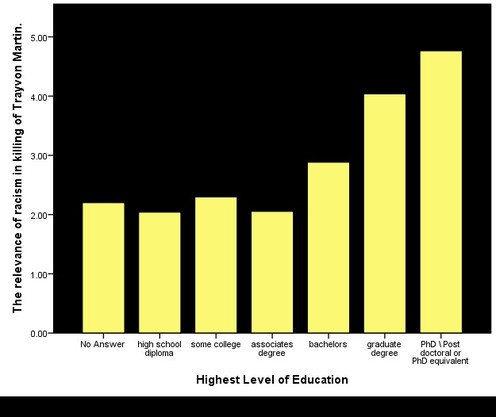 Table 5: Education and Relevance of Racism
Table 5: Education and Relevance of Racism
Education and Relevance of Racism
A Pearson correlation was conducted to determine the relationship between people’s levels of education and how relevant they believed racism was in the killing of Trayvon Martin. A correlation revealed that there is a significant (p<.05) positive relationship between people’s levels of education and how relevant they believed racism was in the killing of Trayvon Martin (.450), such that, as people educational levels increased, the more likely they were to believe that racism was relevant in the killing of Trayvon Martin (see Table 5).
A Pearson correlation was conducted to determine the relationship between people’s levels of education and how relevant they believed racism was in the killing of Trayvon Martin. A correlation revealed that there is a significant (p<.05) positive relationship between people’s levels of education and how relevant they believed racism was in the killing of Trayvon Martin (.450), such that, as people educational levels increased, the more likely they were to believe that racism was relevant in the killing of Trayvon Martin (see Table 5).
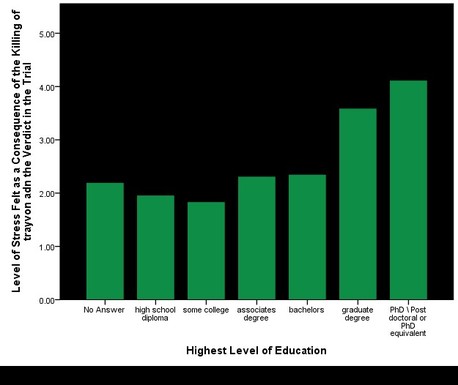 Table 6: Education and Stress
Table 6: Education and Stress
Education and Stress
A Pearson correlation was conducted to determine the relationship between people’s levels of education and the amount of stress they experienced as a result of the outcome of the Zimmerman trial. A correlation revealed that there is a significant (p<.05) positive relationship between people’s levels of education and the amount of stress they experienced as a result of the outcome of the Zimmerman trial (.413), such that the more educated people were the more likely they were to experience stress as a result of the Zimmerman trial (see Table 6).
A Pearson correlation was conducted to determine the relationship between people’s levels of education and the amount of stress they experienced as a result of the outcome of the Zimmerman trial. A correlation revealed that there is a significant (p<.05) positive relationship between people’s levels of education and the amount of stress they experienced as a result of the outcome of the Zimmerman trial (.413), such that the more educated people were the more likely they were to experience stress as a result of the Zimmerman trial (see Table 6).
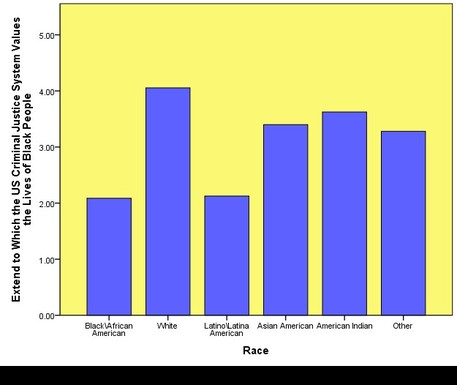 Table 7: ANOVAS
Table 7: ANOVAS
ANOVAS
Analysis of Variances (ANOVA) were conducted comparing the participants’ answers to the survey questions based on their racial identification. A significant difference was found in extent to which people believe that the US criminal justice system values the lives of Black people based on their racial identification (F(5,164)=15.8, p<.05). Tukey’s HSD was used to determine the nature of the variation. The analysis indicates that African Americans believed that the US criminal justice system values Black life significantly less compared to White American, Asian Americans, and American Indians, and those who identify as “other.” Analysis also indicated that Latina/os also believed that the US criminal justice system values Black life significantly less compared to White Americans, Asian American and American Indians and those who identify as “other” (see Table 7).
Analysis of Variances (ANOVA) were conducted comparing the participants’ answers to the survey questions based on their racial identification. A significant difference was found in extent to which people believe that the US criminal justice system values the lives of Black people based on their racial identification (F(5,164)=15.8, p<.05). Tukey’s HSD was used to determine the nature of the variation. The analysis indicates that African Americans believed that the US criminal justice system values Black life significantly less compared to White American, Asian Americans, and American Indians, and those who identify as “other.” Analysis also indicated that Latina/os also believed that the US criminal justice system values Black life significantly less compared to White Americans, Asian American and American Indians and those who identify as “other” (see Table 7).
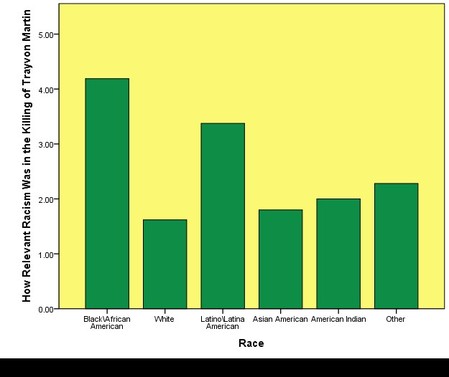 Table 8: Race and the Relevance of Racism in the Killing of Trayvon Martin
Table 8: Race and the Relevance of Racism in the Killing of Trayvon Martin
Race and the Relevance of Racism in the Killing of Trayvon Martin
A significant difference was found in the extent to which people felt that racism was a relevant factor in the killing of Trayvon Martin (F(5,164)=22.2, p<.05). ). Tukey’s HSD was used to determine the nature of the variation. The analysis indicates that African Americans were significantly
more likely to think that racism was a relevant factor in the killing of Trayvon Martin, compared to White American, Asian Americans, and American Indians, and those who identify as “other”. There were no significant differences between African Americans and Latino/a Americans on this matter (see Table 8).
A significant difference was found in the extent to which people felt that racism was a relevant factor in the killing of Trayvon Martin (F(5,164)=22.2, p<.05). ). Tukey’s HSD was used to determine the nature of the variation. The analysis indicates that African Americans were significantly
more likely to think that racism was a relevant factor in the killing of Trayvon Martin, compared to White American, Asian Americans, and American Indians, and those who identify as “other”. There were no significant differences between African Americans and Latino/a Americans on this matter (see Table 8).
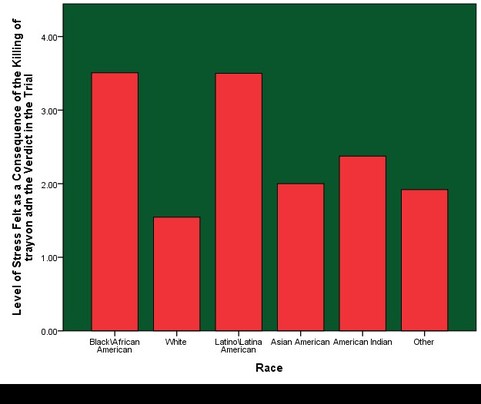 Table 9: Race and Stress
Table 9: Race and Stress
Race and the Extent to Which the Killing of Trayvon Martin and the Trial Outcome Caused People Stress
A significant difference was found between the extents to which the killing of Trayvon Martin and the outcomes of the Zimmerman trial caused them stress based on their racial identification (F(5,164)=15.1, p<.05). The analysis indicates that African Americans were significantly more likely to experience stress as a result of the killing of Trayvon Martin and the outcome of the Zimmerman trial compared to White Americans and those who identify as “other”. There were no significant differences between African Americans, Latino/a Americans, American Indians, and Asian Americans on this matter (Table 9).
A significant difference was found between the extents to which the killing of Trayvon Martin and the outcomes of the Zimmerman trial caused them stress based on their racial identification (F(5,164)=15.1, p<.05). The analysis indicates that African Americans were significantly more likely to experience stress as a result of the killing of Trayvon Martin and the outcome of the Zimmerman trial compared to White Americans and those who identify as “other”. There were no significant differences between African Americans, Latino/a Americans, American Indians, and Asian Americans on this matter (Table 9).
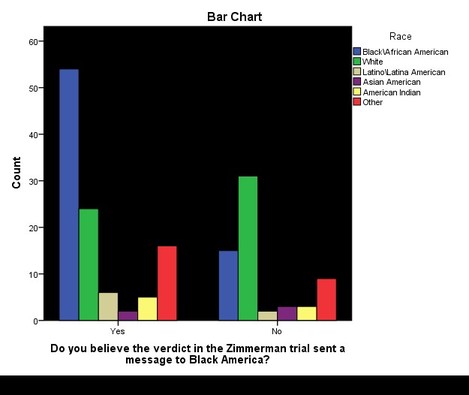 Table 10: Race and a Message to African Americans
Table 10: Race and a Message to African Americans
Race and the Belief the Killing of Trayvon Martin Sent a Message to African Americans
A significant racial difference was found in whether or not people believed that the verdict in the Zimmerman trial sent a message to African Americans (F(5,164)=3.73, p<.05). The analysis indicates that African Americans were significantly more likely to believe that the verdict in the Zimmerman trial sent a message to African Americans compared to White Americans. There were no significant differences between African Americans, Latino/a Americans, American Indians, Asian Americans, and those who identify as “other” on this matter (see Table 10).
A significant racial difference was found in whether or not people believed that the verdict in the Zimmerman trial sent a message to African Americans (F(5,164)=3.73, p<.05). The analysis indicates that African Americans were significantly more likely to believe that the verdict in the Zimmerman trial sent a message to African Americans compared to White Americans. There were no significant differences between African Americans, Latino/a Americans, American Indians, Asian Americans, and those who identify as “other” on this matter (see Table 10).
To the question, “Do you believe that the verdict in the Zimmerman trial sent a message to Black America? If YES, what is the message? Type your answer in the box below,” 32.2% of poll participants who responded were White Americans. Of this, 43% believed the Zimmerman trial sent a message to Black America.
Three major themes were found in the responses made my White survey takers. First, that justice was served in the outcome of the Zimmerman trial.
“Yes, that justice is served on both ends of the race spectrum.”
“All the verdict done was to prove that Zimmerman was innocent. Period.”
“Should have been, Justice was done, you may not like the outcome but it was an
honest verdict by a jury of peers and in accordance with the laws of the state of Florida.”
“Yes, it sent a message, but black America has not learned a thing from it. There is a
justice system in this country, shut up and let it do it’s job.”
The second theme in these responses is the claim that African Americans overuse the “race card” when, in fact, they themselves are being racist towards White Americans. This theme is supported by statements such as the following:
“They will cry racism no matter what! They don’t see things clearly and use the race card
where it does not apply!”
“Stop being Racist Black.”
“That the race card did not work this time.”
“That the racial card can’t be played anymore.”
“Hope so they tend to make a mountain out of molehill about race.”
The final theme in these responses was that the Zimmerman trial sent the wrong message to Black America. Respondents made the following statements:
“Unfortunately, the wrong message. A portion of the Black community feels that justice needs to be taken into their own hands.”
“Because of the actions of Al Sharpton and Jesse Jackson I believe it did, unfortunately
it was a false message.”
“Yes that y’all don’t care about what happens to black Americans in the USA. And y’all really need to understand that Zimmerman had everybody on his side with money paying to get him out of this. And they did just that if the cops on 911 told him not to follow that lil boy why in the hell did he do it anyway. That alone should have got him time but he had money on his side and living in the USA myself I know if you got money and you’re not black you will get whatever you want out of them, but if you’re black living in the USA there isn’t much you can do if they say you did it no matter what they got you a still going to get in trouble for it. They had that lil boy on tape fighting saying please stop and y’all are going to make black America people no give a shit on what they do because the USA don’t like blacks and I think it’s going to be something big out of this if USA don’t start showing the blacks they got right to so before y’all keep taking money from people to help out someone that just killed a kid for no reason think about what the outcome is going to be ‘cause I think that man should do his time just like the blacks would do y’all will send them to jail for it but Zimmerman had money on his side so he gets out if that’s just not right.”
40.80% of respondents who answered this question were African American. Of these respondents, 70% answered YES. The major themes in these responses were: 1) Little value for Black life - especially that of Black males; 2) the flawed criminal justice system; 3) that White privilege continues to thrive and; 4) that African Americans are criminalized simply because they are Black.
40% of African American respondents stated that the US as a society has little value for Black\African American bodies. Example:
“The verdict in the Zimmerman trial sent the message that Black bodies do not matter and serves as a reminder as to how far the criminal justice system hasn't come with regard to seeking justice for Black life.”
“The life of a young black man is devalued. If the situation was reverse than the black man would probably serve a life sentence.”
“Black males are human targets unworthy of humanity, innocence, or justice.”
25% of African American respondents stated that the criminal justice system was not designed for the protection of African Americans. The following statements were made.
“The message sent was not new, but rather a reinforcement of the same old message that Black Americans are disillusioned if they believe that they will receive equal protection under the law. The U.S. was never meant to be our home.”
“There are laws that make it easier for someone to get away with murdering African Americans without even a small penalty. The laws seem to be designed to take care of animals more than the life of an African American.”
“Yes. Jim Crow is alive and thriving in this country.”
10% of African American respondents stated that the message sent to Black America was that White privilege continues to thrive. For example:
“Whites will always get away with murdering blacks but not the other way around. blacks will never be given power in america. anything that will empower blacks will be taken away.”
“White people live in fear of those who violate our social contract. Black people live in fear of those who enforce it.”
“In the United States, any white man can murder any Black person at any time without fear of repercussions.”
10% of African American survey-takers stated that African Americans are criminalized simply for being Black\African American. This is indicated by statements such as the following:
“If a young Black male is involved, he is guilty until proven innocent.”
“You will be criminalized as an African American. Your life means nothing, it is not to be preserved.”
“Being black is just cause for others suspicion and if that suspicion results in your death there is no justice.”
Perceptions about the U.S.
76% of poll participants stated that the killing of Trayvon Martin and the subsequent acquittal of George Zimmerman did NOT cause them to think any differently about the United States than before. Of the 76% of survey-takers who answered the question, “Did the killing of Trayvon Martin and the acquittal of George Zimmerman cause you to think about the US any differently than you did before? If YES, explain below,” 32.2% identified as White. While 77% of those racially identified as White stated that the Martin-Zimmerman had no bearing on how they viewed the United States, 23% stated that it did.
75% of the White-identified respondents who answered “yes” to this question made statements that point to the racism of African Americans and the just and fair way in which the Martin-Zimmerman case was carried out. This was the most significant theme found in the responses to this question made by White-identified survey-takers. This included the attention given to Martin-Zimmerman case by political and religious leaders in the Black community. White-identified respondents made statements such as the following:
“If Trayvon had been killed in the military defending this country, Obama wouldn’t even known his name. If Al Sharpton, Jesse Jackson, Obama and others had kept their noses out of it, it wouldn’t have become a racial issue. Trayvon was a thug looking for trouble, his history…the truth about him spells it out!!! This survey along with the news media just further shows this to be racial. If it had been a black person who shot Trayvon, it may not have even made the news!!!”
“America is extremely racist. If a white American had been killed by an African American, it would not have made the news. Why isn’t Al Sharpton proactive instead of reactive? The only time he makes the news is during a white on black murder trial.”
“That many more black people than I thought are still extremely racist and or intellectually dishonest.”
“White people are standing up for themselves.”
“Before this trial, I never realized how much Black Americans hate White Americans.”
“Yep, thought it was about time justice was served right.”
However, a less significant theme in the responses made by White-identified survey takers was related to the acknowledgement of the continued marginalization and oppression of Black people. 16.7% of White-identified respondents seemed to suggest there was a degree of unfairness and injustice in the Martin-Zimmerman case. The following are examples of statements made by White-identified respondents:
“ Yes it really showed me that y’all don’t really care about blacks in the USA. I’m white living the USA and that’s how I feel that white man had money and he got out of it and that family got to live with the the rest of their life knowing that USA will not fight for them unless they are white. You have all them blacks fighting for us and they don’t even have the same rights we do just because they are black.”
“There was clear evidence that Zimmerman committed a murder.”
Solutions to the Problem of Racial Injustice
32% of respondents who answered the question, “In your opinion, what is the most important solution to the problem of racial injustice in the US?” identified as White. Four significant themes surfaced in these responses: 1) More media control; 2) Personal responsibility; 3) Racism against White people and; 4) Prevention of “race-baiting.”
18% of White respondents who answered this questions stated that more media restraint was necessary to prevent high-profile issues such as the Martin-Zimmerman case to spin out of control. Survey-takers made statements such as the following:
“The media should stop focusing on race as the biggest part of issues that arise.”
“Leave the media out of it, let the system do its job.”
16% of White respondents pointed to the importance of personal responsibility and accountability. This theme is represented by statements such as the following:
“I believe the Black population does not get the fact that the actions of it lower class needs to be addressed and corrected. Their behavior needs to change of the tarnished image will never change! Keep in mind hoodies were made popular by street gangs, can be found in many races not just the Black community. Stand your ground was not a part of this case, self defense was.”
“Raise better children, with strict discipline. Be the boss in your house, don’t let your children dress and act ‘thuggy.’ Stress education, and DON’T have children that you can’t afford!! Do all this, and with lots of prayer, and luck, more often than not, your children WON’T be in the system!! Problem solved!!”
14% of White respondents stated that there exists a significant amount of racism towards White people. Statements such as the following were made.
“The Black racists needs to grow up”
“The White people of the States need to stand up and be force against all this racist bullsh*t. The Black kill Whites, nothing said. Reverse the roll, all hell breaks loose. Time to bring a end to this.”
Finally, 12% of White respondents indicated that Black leaders such as Al Sharpton and Jesse Jackson not only played a role in bringing attention to the racial aspects of the Martin-Zimmerman case, but must be prevented from “race-baiting.” For example:
“For the Jesse Jacksons and the Al Sharptons of this country to shut the hell up and quit running around spewing their venomous hate, fanning the flames of racism and for the Black community to wake up to the fact that these jackasses are doing them more harm than good!!”
“Rid ourselves of Sharpton’s and Jackson’s that create hate.”
41% of respondents who answered the question,“In your opinion, what is the most important solution to the problem of racial injustice in the US?” identified as African American. Six major themes were identified in these responses were: 1) Acknowledgment of the existence of a problem; 2) Education; 3) Reorganization and redistribution of power; 4) Systemic change; 5) No solution and; 6) Change in laws. 18% of African Americans stated that to acknowledge the existence of a problem, an open and honest conversation must take place. For example, respondents stated:
“Mutually open and honest discourse about race and not just Blackness; among all people regardless of racial identification.”
“More honest dialogue between races and improvement of minority communities.”
“Open and honest conversations between black and white people. I think that some white people still don't understand what it is like to be black in America. And how it feels to have to dispel negative assumptions that are constantly being reinforced in the media and the justice system.”
11% of African American respondents pointed to the importance of education as a solution to racial injustice in the US. For example:
“A quality and equal education for all children in America. This include curricular changes that reflect the experiences of all residents of the US and an emphasis on a global understanding of life and knowledge.”
“Educate at home 1st! Remove the blocks & blindfolds. Our current President is Black, & he too, still gets treated differently.”
“Getting true historical facts out into the general public so that the negative attitudes toward African Americans can be shifted. There is no reason for those negative attitudes because African Americans are the recipients of one of the most horrendous cases of massive human rights abuses in human history.”
10% of African American respondents called for the reorganization and redistribution of power, specifically in the political, economic, and cultural realms. The following statements reflect this:
“A re-ordering of our understanding of democratic principles and notions of citizenship and nation.”
“To create systems for ourselves.”
“Organization and use of political power.”
10% of African Americans stated that systemic change was necessary to address racial injustice. This is distinct from reorganizing the system because respondents spoke to the improvement of the existing system, rather than changing the structure of the system altogether. For example:
“Improving our judicial system including our jury selection process. Electing candidates that don’t serve extreme right wing draconian laws.”
“There are specific laws that must be changed such as Stand your Ground.”
“DUE PROCESS! A jury of one’s peers AND representation! The judge did not allow for race to be discussed, while male prosecutors who had no discernment in their presentation of the evidence and no imagination of being able to represent Trayvon in their narrative, and a District Attorney prosecutor who is seeking re-election, a member of the Tea Party, and set the change to second-degree murder which was too difficult to stick - as is the case in many trials involving African-Americans.”
Interestingly, 10% of African American respondents stated that there was no forseeable solution to the problems faced by the Black community as highlighted by the Martin-Zimmerman case. Respondents made the following statements:
“It’s hard to say because we are still being judged by our skin color unfortunately.”
“I do not see a solution to the problem of racial injustice in the US. Black people are a people with a foundation and even with the advancements of individuals. The lack of a foundation continues to be passed down from generation to generation.”
“I don't think there is a solution, the society we live in is a set up conspiracy to oppress!”
Gender Differences: T-Test
A T-test was conducted to calculate the difference between males’ and females’ beliefs about the extent to which the US criminal justice system values the lives of African Americans. The T-test indicated a significant difference between males’ and females’ beliefs about the extent to which the US criminal justice system values the lives of African Americans (t(164) = -4.68, p<.05), such that females are significantly less likely than males to believe that the US criminal justice system values the lives of African Americans.
A T-test was conducted to calculate the difference between males’ and females’ beliefs that the verdict in the Zimmerman trial sent a message to African Americans. The T-test indicated a significant difference between males’ and females’ beliefs that the verdict in the Zimmerman trial sent a message to African Americans (t(164) = -4.42, p<.05), males are significantly less likely than females to believe that the verdict in the Zimmerman trial sent a message to African Americans.
A T-test was conducted to calculate the difference between whether or not the killing of Trayvon Martin and the acquittal of Zimmerman caused males or females to think differently about the United States than they did before. The T-test indicated a significant difference between whether or not the killing of Trayvon Martin and the acquittal of Zimmerman males or females to think differently about the United States than they did before (t(164) = 5.25, p<.05), such that, killing of Trayvon Martin and the acquittal of Zimmerman was more likely to cause females to think differently about the US compared to males.
Three major themes were found in the responses made my White survey takers. First, that justice was served in the outcome of the Zimmerman trial.
“Yes, that justice is served on both ends of the race spectrum.”
“All the verdict done was to prove that Zimmerman was innocent. Period.”
“Should have been, Justice was done, you may not like the outcome but it was an
honest verdict by a jury of peers and in accordance with the laws of the state of Florida.”
“Yes, it sent a message, but black America has not learned a thing from it. There is a
justice system in this country, shut up and let it do it’s job.”
The second theme in these responses is the claim that African Americans overuse the “race card” when, in fact, they themselves are being racist towards White Americans. This theme is supported by statements such as the following:
“They will cry racism no matter what! They don’t see things clearly and use the race card
where it does not apply!”
“Stop being Racist Black.”
“That the race card did not work this time.”
“That the racial card can’t be played anymore.”
“Hope so they tend to make a mountain out of molehill about race.”
The final theme in these responses was that the Zimmerman trial sent the wrong message to Black America. Respondents made the following statements:
“Unfortunately, the wrong message. A portion of the Black community feels that justice needs to be taken into their own hands.”
“Because of the actions of Al Sharpton and Jesse Jackson I believe it did, unfortunately
it was a false message.”
“Yes that y’all don’t care about what happens to black Americans in the USA. And y’all really need to understand that Zimmerman had everybody on his side with money paying to get him out of this. And they did just that if the cops on 911 told him not to follow that lil boy why in the hell did he do it anyway. That alone should have got him time but he had money on his side and living in the USA myself I know if you got money and you’re not black you will get whatever you want out of them, but if you’re black living in the USA there isn’t much you can do if they say you did it no matter what they got you a still going to get in trouble for it. They had that lil boy on tape fighting saying please stop and y’all are going to make black America people no give a shit on what they do because the USA don’t like blacks and I think it’s going to be something big out of this if USA don’t start showing the blacks they got right to so before y’all keep taking money from people to help out someone that just killed a kid for no reason think about what the outcome is going to be ‘cause I think that man should do his time just like the blacks would do y’all will send them to jail for it but Zimmerman had money on his side so he gets out if that’s just not right.”
40.80% of respondents who answered this question were African American. Of these respondents, 70% answered YES. The major themes in these responses were: 1) Little value for Black life - especially that of Black males; 2) the flawed criminal justice system; 3) that White privilege continues to thrive and; 4) that African Americans are criminalized simply because they are Black.
40% of African American respondents stated that the US as a society has little value for Black\African American bodies. Example:
“The verdict in the Zimmerman trial sent the message that Black bodies do not matter and serves as a reminder as to how far the criminal justice system hasn't come with regard to seeking justice for Black life.”
“The life of a young black man is devalued. If the situation was reverse than the black man would probably serve a life sentence.”
“Black males are human targets unworthy of humanity, innocence, or justice.”
25% of African American respondents stated that the criminal justice system was not designed for the protection of African Americans. The following statements were made.
“The message sent was not new, but rather a reinforcement of the same old message that Black Americans are disillusioned if they believe that they will receive equal protection under the law. The U.S. was never meant to be our home.”
“There are laws that make it easier for someone to get away with murdering African Americans without even a small penalty. The laws seem to be designed to take care of animals more than the life of an African American.”
“Yes. Jim Crow is alive and thriving in this country.”
10% of African American respondents stated that the message sent to Black America was that White privilege continues to thrive. For example:
“Whites will always get away with murdering blacks but not the other way around. blacks will never be given power in america. anything that will empower blacks will be taken away.”
“White people live in fear of those who violate our social contract. Black people live in fear of those who enforce it.”
“In the United States, any white man can murder any Black person at any time without fear of repercussions.”
10% of African American survey-takers stated that African Americans are criminalized simply for being Black\African American. This is indicated by statements such as the following:
“If a young Black male is involved, he is guilty until proven innocent.”
“You will be criminalized as an African American. Your life means nothing, it is not to be preserved.”
“Being black is just cause for others suspicion and if that suspicion results in your death there is no justice.”
Perceptions about the U.S.
76% of poll participants stated that the killing of Trayvon Martin and the subsequent acquittal of George Zimmerman did NOT cause them to think any differently about the United States than before. Of the 76% of survey-takers who answered the question, “Did the killing of Trayvon Martin and the acquittal of George Zimmerman cause you to think about the US any differently than you did before? If YES, explain below,” 32.2% identified as White. While 77% of those racially identified as White stated that the Martin-Zimmerman had no bearing on how they viewed the United States, 23% stated that it did.
75% of the White-identified respondents who answered “yes” to this question made statements that point to the racism of African Americans and the just and fair way in which the Martin-Zimmerman case was carried out. This was the most significant theme found in the responses to this question made by White-identified survey-takers. This included the attention given to Martin-Zimmerman case by political and religious leaders in the Black community. White-identified respondents made statements such as the following:
“If Trayvon had been killed in the military defending this country, Obama wouldn’t even known his name. If Al Sharpton, Jesse Jackson, Obama and others had kept their noses out of it, it wouldn’t have become a racial issue. Trayvon was a thug looking for trouble, his history…the truth about him spells it out!!! This survey along with the news media just further shows this to be racial. If it had been a black person who shot Trayvon, it may not have even made the news!!!”
“America is extremely racist. If a white American had been killed by an African American, it would not have made the news. Why isn’t Al Sharpton proactive instead of reactive? The only time he makes the news is during a white on black murder trial.”
“That many more black people than I thought are still extremely racist and or intellectually dishonest.”
“White people are standing up for themselves.”
“Before this trial, I never realized how much Black Americans hate White Americans.”
“Yep, thought it was about time justice was served right.”
However, a less significant theme in the responses made by White-identified survey takers was related to the acknowledgement of the continued marginalization and oppression of Black people. 16.7% of White-identified respondents seemed to suggest there was a degree of unfairness and injustice in the Martin-Zimmerman case. The following are examples of statements made by White-identified respondents:
“ Yes it really showed me that y’all don’t really care about blacks in the USA. I’m white living the USA and that’s how I feel that white man had money and he got out of it and that family got to live with the the rest of their life knowing that USA will not fight for them unless they are white. You have all them blacks fighting for us and they don’t even have the same rights we do just because they are black.”
“There was clear evidence that Zimmerman committed a murder.”
Solutions to the Problem of Racial Injustice
32% of respondents who answered the question, “In your opinion, what is the most important solution to the problem of racial injustice in the US?” identified as White. Four significant themes surfaced in these responses: 1) More media control; 2) Personal responsibility; 3) Racism against White people and; 4) Prevention of “race-baiting.”
18% of White respondents who answered this questions stated that more media restraint was necessary to prevent high-profile issues such as the Martin-Zimmerman case to spin out of control. Survey-takers made statements such as the following:
“The media should stop focusing on race as the biggest part of issues that arise.”
“Leave the media out of it, let the system do its job.”
16% of White respondents pointed to the importance of personal responsibility and accountability. This theme is represented by statements such as the following:
“I believe the Black population does not get the fact that the actions of it lower class needs to be addressed and corrected. Their behavior needs to change of the tarnished image will never change! Keep in mind hoodies were made popular by street gangs, can be found in many races not just the Black community. Stand your ground was not a part of this case, self defense was.”
“Raise better children, with strict discipline. Be the boss in your house, don’t let your children dress and act ‘thuggy.’ Stress education, and DON’T have children that you can’t afford!! Do all this, and with lots of prayer, and luck, more often than not, your children WON’T be in the system!! Problem solved!!”
14% of White respondents stated that there exists a significant amount of racism towards White people. Statements such as the following were made.
“The Black racists needs to grow up”
“The White people of the States need to stand up and be force against all this racist bullsh*t. The Black kill Whites, nothing said. Reverse the roll, all hell breaks loose. Time to bring a end to this.”
Finally, 12% of White respondents indicated that Black leaders such as Al Sharpton and Jesse Jackson not only played a role in bringing attention to the racial aspects of the Martin-Zimmerman case, but must be prevented from “race-baiting.” For example:
“For the Jesse Jacksons and the Al Sharptons of this country to shut the hell up and quit running around spewing their venomous hate, fanning the flames of racism and for the Black community to wake up to the fact that these jackasses are doing them more harm than good!!”
“Rid ourselves of Sharpton’s and Jackson’s that create hate.”
41% of respondents who answered the question,“In your opinion, what is the most important solution to the problem of racial injustice in the US?” identified as African American. Six major themes were identified in these responses were: 1) Acknowledgment of the existence of a problem; 2) Education; 3) Reorganization and redistribution of power; 4) Systemic change; 5) No solution and; 6) Change in laws. 18% of African Americans stated that to acknowledge the existence of a problem, an open and honest conversation must take place. For example, respondents stated:
“Mutually open and honest discourse about race and not just Blackness; among all people regardless of racial identification.”
“More honest dialogue between races and improvement of minority communities.”
“Open and honest conversations between black and white people. I think that some white people still don't understand what it is like to be black in America. And how it feels to have to dispel negative assumptions that are constantly being reinforced in the media and the justice system.”
11% of African American respondents pointed to the importance of education as a solution to racial injustice in the US. For example:
“A quality and equal education for all children in America. This include curricular changes that reflect the experiences of all residents of the US and an emphasis on a global understanding of life and knowledge.”
“Educate at home 1st! Remove the blocks & blindfolds. Our current President is Black, & he too, still gets treated differently.”
“Getting true historical facts out into the general public so that the negative attitudes toward African Americans can be shifted. There is no reason for those negative attitudes because African Americans are the recipients of one of the most horrendous cases of massive human rights abuses in human history.”
10% of African American respondents called for the reorganization and redistribution of power, specifically in the political, economic, and cultural realms. The following statements reflect this:
“A re-ordering of our understanding of democratic principles and notions of citizenship and nation.”
“To create systems for ourselves.”
“Organization and use of political power.”
10% of African Americans stated that systemic change was necessary to address racial injustice. This is distinct from reorganizing the system because respondents spoke to the improvement of the existing system, rather than changing the structure of the system altogether. For example:
“Improving our judicial system including our jury selection process. Electing candidates that don’t serve extreme right wing draconian laws.”
“There are specific laws that must be changed such as Stand your Ground.”
“DUE PROCESS! A jury of one’s peers AND representation! The judge did not allow for race to be discussed, while male prosecutors who had no discernment in their presentation of the evidence and no imagination of being able to represent Trayvon in their narrative, and a District Attorney prosecutor who is seeking re-election, a member of the Tea Party, and set the change to second-degree murder which was too difficult to stick - as is the case in many trials involving African-Americans.”
Interestingly, 10% of African American respondents stated that there was no forseeable solution to the problems faced by the Black community as highlighted by the Martin-Zimmerman case. Respondents made the following statements:
“It’s hard to say because we are still being judged by our skin color unfortunately.”
“I do not see a solution to the problem of racial injustice in the US. Black people are a people with a foundation and even with the advancements of individuals. The lack of a foundation continues to be passed down from generation to generation.”
“I don't think there is a solution, the society we live in is a set up conspiracy to oppress!”
Gender Differences: T-Test
A T-test was conducted to calculate the difference between males’ and females’ beliefs about the extent to which the US criminal justice system values the lives of African Americans. The T-test indicated a significant difference between males’ and females’ beliefs about the extent to which the US criminal justice system values the lives of African Americans (t(164) = -4.68, p<.05), such that females are significantly less likely than males to believe that the US criminal justice system values the lives of African Americans.
A T-test was conducted to calculate the difference between males’ and females’ beliefs that the verdict in the Zimmerman trial sent a message to African Americans. The T-test indicated a significant difference between males’ and females’ beliefs that the verdict in the Zimmerman trial sent a message to African Americans (t(164) = -4.42, p<.05), males are significantly less likely than females to believe that the verdict in the Zimmerman trial sent a message to African Americans.
A T-test was conducted to calculate the difference between whether or not the killing of Trayvon Martin and the acquittal of Zimmerman caused males or females to think differently about the United States than they did before. The T-test indicated a significant difference between whether or not the killing of Trayvon Martin and the acquittal of Zimmerman males or females to think differently about the United States than they did before (t(164) = 5.25, p<.05), such that, killing of Trayvon Martin and the acquittal of Zimmerman was more likely to cause females to think differently about the US compared to males.
